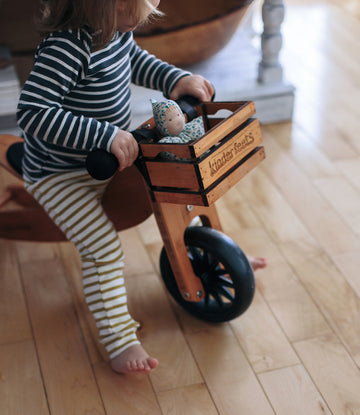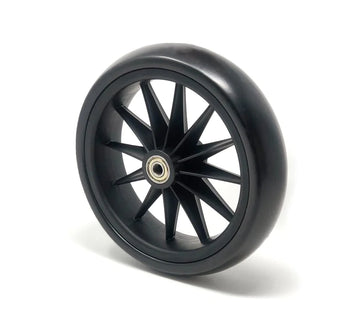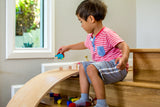Play is an essential aspect of childhood, serving as a gateway to learning, creativity, and physical and social development. Two educational philosophies that have deeply influenced the concept of play are Montessori and Waldorf. In this article, we delve into the rich history of Montessori and Waldorf classroom play, exploring their origins, principles, and impact on the development of children's toys, including Kinderfeets' commitment to promoting holistic child development through an active and imaginative play experience.

Montessori Play
Founded by Dr. Maria Montessori in the early 20th century, the Montessori method revolutionized early childhood education by emphasizing independence, freedom within limits, and respect for the child's natural psychological, physical, and social development. Central to the Montessori philosophy is the concept of the prepared environment, where children are given access to carefully selected materials that promote hands-on learning and sensory exploration.
Montessori classroom play is characterized by the use of educational materials that are designed to be self-correcting, allowing children to learn through trial and error. These materials are often made from natural materials like wood and fabric, reflecting Montessori's emphasis on connecting children with the natural world. Toys in Montessori classrooms are simple, aesthetically pleasing, and designed to promote specific skills, such as fine motor development, hand-eye coordination, and spatial awareness.
Waldorf Classroom Play
The Waldorf education system, developed by Rudolf Steiner in the early 20th century, also places a strong emphasis on play as a means of fostering creativity, imagination, and social skills. Waldorf classroom play is characterized by open-ended toys and materials that encourage children to use their imagination and creativity to create their own play scenarios.
Waldorf toys are often made from natural materials like wood, wool, and cotton, reflecting the Waldorf philosophy's focus of bringing children as close to Mother Nature as possible via play. These toys are designed to be simple and unstructured, allowing children to use them in a variety of ways and encouraging open-ended, imaginative play without so much structure and direction.

Kinderfeets' Commitment to Montessori and Waldorf Principles
Kinderfeets is deeply inspired by the Montessori and Waldorf philosophies. All products are designed to promote physical activity, creativity, and imagination, aligning with the principles of both educational approaches. Furthermore, each collection features opportunities for children to play independently and open-endedly.
- Kinderfeets' Balance Bikes are perfect examples of toys that align with both Montessori and Waldorf principles. These bikes promote physical activity and gross motor skill development, allowing children to explore their environment independently and build confidence in their abilities.
- The Kinderboard is another great option for promoting active play and balance development. These balance boards can be used in a variety of ways, encouraging creativity and imagination in children's play.
- The Kinderfeets Pikler Gym System is inspired by the Montessori philosophy of promoting independence and physical development. These versatile toys can be used in a variety of ways, encouraging children to use their imagination and creativity to create their own play scenarios.
- The Kinderfeets Toybox & Walker is a great storage solution for keeping toys organized and accessible. Made from durable, sustainable materials, this dual-purpose walker reflects the Montessori and Waldorf emphasis on natural materials and simplicity.

By incorporating these Kinderfeets toys into playtime, parents and educators can provide children with enriching play experiences that align with the principles of Montessori and Waldorf education, promoting holistic development and creativity.
The Montessori and Waldorf educational philosophies have had a profound impact on the concept of play, emphasizing the importance of natural materials, open-ended toys, and hands-on learning. Kinderfeets' commitment to promoting holistic child development through its eco-friendly, wooden toys reflects the enduring influence of these educational approaches on the design and development of children's toys.



